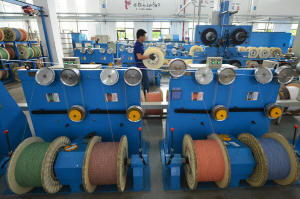Downbeat China factory output, retail sales add to urgency for stronger
stimulus
 Send a link to a friend
Send a link to a friend
 [September 14, 2024] By
Kevin Yao, Ellen Zhang and Ethan Wang [September 14, 2024] By
Kevin Yao, Ellen Zhang and Ethan Wang
BEIJING (Reuters) -China's industrial output growth slowed to a
five-month low in August, while retail sales and new home prices
weakened further, bolstering the case for aggressive stimulus to shore
up the economy and help it hit its annual growth target.
The sluggish data released on Saturday echoed soft bank lending figures
on Friday, underscoring weak growth momentum of the $18.6 trillion
economy, the world's second-largest, in the third quarter.
Industrial output in August expanded 4.5% year-on-year, slowing from the
5.1% pace in July and marking the slowest growth since March, data from
the National Bureau of Statistics (NBS) showed on Saturday.
That missed expectations for 4.8% growth in a Reuters poll of 37
analysts.
Retail sales, a key gauge of consumption, rose only 2.1% in August
despite the summer travel peak, decelerating from a 2.7% increase in
July. Analysts had expected retail sales, which have been anemic this
year, to grow 2.5%.
"The momentum is slowing down...The bottleneck remains domestic demand,"
said Xing Zhaopeng, ANZ's senior China strategist.
China's oil refinery output fell for a fifth month while crude steel
output in August fell 6.1% from July, suggesting disappointing demand.

Faltering Chinese economic activity has already prompted global
brokerages to scale back their 2024 China growth forecasts to below the
government's official target of around 5%. The economy grew by 4.7% in
the second quarter.
"The Q3 GDP is likely to be lower than Q2 based on current data flows.
We expect large-scale stimulus to come soon," said Xing.
President Xi Jinping urged authorities on Thursday to strive to achieve
the country's annual economic and social development goals, state media
reported, amid expectations that more steps are needed to bolster a
flagging economic recovery.
"As we are already toward the tail-end of the third quarter, time is
running low for policymakers to introduce measures to buoy the economy
amid numerous headwinds," said Lynn Song, chief China economist at ING.
The protracted property slump has led to Chinese consumers cutting back
on spending. Some experts have even proposed distributing shopping
vouchers to counter the trend.
Premier Li Qiang said last month the country will focus on stimulating
consumption and look at measures to boost household income.
A central bank official said last week China still has room to lower the
amount of cash banks must hold as reserves while it faces some
constraints in cutting interest rates.
[to top of second column] |

An employee works at a production line manufacturing optical fiber
cables at a factory of the Zhejiang Headway Communication Equipment
Co in Huzhou, Zhejiang province, China May 15, 2019.
REUTERS/Stringer/File Photo

NO PROPERTY SECTOR REBOUND
Fixed asset investment rose 3.4% in the first eight months of 2024
from the same period a year earlier, compared with an expected 3.5%
expansion. It grew 3.6% in the January to July period.
Liu Aihua, spokesperson of NBS, said at a press conference on
Saturday that China's economic operations remained stable, but high
temperatures and natural disasters affected growth last month.
Cash-strapped local governments issued bonds at a quicker pace in
August for construction of major projects, with Liu saying the
quickening bond issuance and policy initiatives will support
investment growth.
However, the troubled property sector remains a major drag on
growth. China's new home prices fell at the fastest pace in more
than nine years in August. Only two of 70 surveyed cities reported
home prices gains both in monthly and annual terms in August.
Property sales and investment slumped in the first eight months of
the year.
To aid the housing market, China may cut interest rates on over $5
trillion in outstanding mortgages as early as this month, according
to Bloomberg News.
While Beijing has ramped up efforts to rescue the housing market,
many analysts say much more aggressive steps are needed to help
debt-laden developers and encourage would-be home buyers back to the
market.
Some other economic indicators released on Saturday too were
unflattering. China's nationwide survey-based jobless rate climbed
to 5.3% in August from 5.2% in the previous month, the NBS said,
adding that more college graduates entered the job market to hunt
offers.
The one bright spot for China recently has been exports, but
analysts are not sure for how long the trend of rising exports will
continue, given the increasing trade tensions with some countries
and regions.
Zhiwei Zhang, chief economist at Pinpoint Asset Management, said
investors will shift focus and wonder what will happen to growth in
2025.
"Will the tight fiscal policy stance continue into next year, when
global growth will likely slow down and put pressure on China's
exports?," Zhang said.
(Additional reporting by Liangping Gao; Editing by Muralikumar
Anantharaman)
[© 2024 Thomson Reuters. All rights
reserved.]
This material may not be published,
broadcast, rewritten or redistributed.
Thompson Reuters is solely responsible for this content.
 |